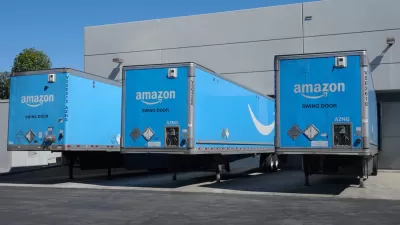With demand for sprawling e-commerce warehouses growing, New Jersey’s State Planning Commission has released a series of documents outlining best practices for cities examining warehouse proposals.

Writing on CentralJersey.com, Tom Gilbert, Co-Executive Director of New Jersey Conservation, highlights a set of guidance documents released by the State Planning Commission that informs towns about the impact of warehouse sprawl to give them important context for making decisions about warehouse proposals in their areas.
As Gilbert writes, “New Jersey is a ‘home rule’ state, so most decisions affecting land-use are made at the local level. Our state also has a history of statewide and regional planning, which is often needed to address challenges that municipalities can’t deal with on their own.”
According to the commission’s report, “With its strategic geographic position, skilled workforce, major consumer markets, and robust transportation infrastructure that serves the entire Northeast, New Jersey is an ideal location for the warehousing and goods movement industries.” Some towns are tempted by the jobs, tax revenue, and other benefits warehouses can bring. “But many other towns – often bolstered by vehement citizen opposition – are concerned that warehouse development will lead to the loss of prime farmland, truck traffic, noise, dust, air pollution and potential flooding that would irreparably harm the quality of life in their communities.”
The guidance documents “provide a detailed checklist of factors for towns to consider when developing or updating their master plans and zoning ordinances.” Some key points include:
- “Towns should update and refine their regulations to ensure that they accurately assess their ability to handle truck traffic and related impacts.”
- “Zoning should be very specific, not broad.”
- “While warehouses aren’t covered in the state’s Environmental Justice Law, municipalities should take into account the impacts of air pollution on overburdened communities.”
For Gilbert, these documents are a useful first step, but “More tools will be needed to fix this problem, such as model ordinances, multi-municipal planning, and carrots or sticks from the state to align warehouse development with the guidance.”
FULL STORY: The State We’re In: Helping New Jersey towns tackle warehouse sprawl

Trump Administration Could Effectively End Housing Voucher Program
Federal officials are eyeing major cuts to the Section 8 program that helps millions of low-income households pay rent.

Planetizen Federal Action Tracker
A weekly monitor of how Trump’s orders and actions are impacting planners and planning in America.

Ken Jennings Launches Transit Web Series
The Jeopardy champ wants you to ride public transit.

USDOT Waters Down Self-Driving Car Regulations
The agency is reducing reporting requirements for autonomous vehicles and cars with self-driving features, prompting concern among safety advocates who say transparency is essential to the safe deployment of AV technology.

‘Minnesota Nice’ Isn’t so Nice When You Can’t Find a Place to Live
The Economic Development and Housing Challenge Program can help address the scourge of homelessness among Indigenous people.

NYC Open Streets Organizers Call for City Support
The number of open streets projects has dropped year after year as volunteer groups struggle to fund and staff them.
Urban Design for Planners 1: Software Tools
This six-course series explores essential urban design concepts using open source software and equips planners with the tools they need to participate fully in the urban design process.
Planning for Universal Design
Learn the tools for implementing Universal Design in planning regulations.
Heyer Gruel & Associates PA
Ada County Highway District
Institute for Housing and Urban Development Studies (IHS)
City of Grandview
Harvard GSD Executive Education
Toledo-Lucas County Plan Commissions
Salt Lake City
NYU Wagner Graduate School of Public Service





























